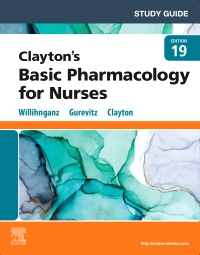
Study Guide for Clayton's Basic Pharmacology for Nurses - Elsevier eBook on VitalSource, 19th Edition
Elsevier eBook on VitalSource

Now $35.14
Reinforce your understanding of nursing pharmacology and prepare for success on the NCLEX-PN® exam! With chapters corresponding to the chapters in Basic Pharmacology for Nurses, 19th Edition, this study guide provides a variety of exercises to help you review and practice the LPN/LVN’s role in drug therapy and patient care. Review questions make it easier to achieve the chapter objectives from the textbook, and patient scenarios help you develop clinical judgment skills. Now with Next Generation NCLEX® (NGN)-style case studies and questions, this study tool also ensures that you will be ready for the critical thinking questions on the NGN exam.
Newer Edition Available
Study Guide for Clayton's Basic Pharmacology for Nurses - Elsevier E-Book on VitalSource
-
- Reader-friendly writing style and organization make it easier to review and practice nursing pharmacology concepts
- Variety of exercises reinforce your understanding with multiple-choice, matching, and select-all-that-apply questions, as well as crossword puzzles
- Questions on medication administration reinforce your knowledge of drugs and safety in performing procedures
-
- NEW! Next Generation NCLEX® (NGN)-style questions provide practice for the new question formats on the NGN licensure exam
- NEW! Case studies in clinical chapters allow you to review, practice, and apply clinical judgment skills
- NEW! Updated exercises cover the new content in the text, including newly approved pharmaceutical drugs and treatments
-
Unit 1: Applying Pharmacology to Nursing Practice
1. Drug Definitions, Standards, and Information Sources
2. Basic Principles of Drug Action and Drug Interactions
3. Drug Action Across the Life Span
4. The Nursing Process and Pharmacology
5. Patient Education to Promote Health
Unit 2: Illustrated Atlas of Medication Administration
6. Principles of Medication Administration and Medication Safety
7. Percutaneous Administration
8. Enteral Administration
9. Parenteral Administration: Safe Preparation of Parenteral Medications
10. Parenteral Administration: Intradermal, Subcutaneous, and Intramuscular Routes
11. Parenteral Administration: Intravenous Route
Unit 3: Drugs Affecting the Autonomic and Central Nervous Systems
12. Drugs Affecting the Autonomic Nervous System
13. Drugs Used for Sleep
14. Drugs Used for Neurodegenerative Disorders (NEW!)
15. Drugs Used for Anxiety Disorders
16. Drugs Used for Depressive and Bipolar Disorders
17. Drugs Used for Psychoses
18. Drugs Used for Seizure Disorders
19. Drugs Used for Pain Management Unit 4: Drugs Affecting the Cardiovascular System
20. Introduction to Cardiovascular Disease and Metabolic Syndrome
21. Drugs Used to Treat Dyslipidemias
22. Drugs Used to Treat Hypertension
23. Drugs Used to Treat Dysrhythmias
24. Drugs Used to Treat Angina Pectoris
25. Drugs Used to Treat Peripheral Vascular Disease
26. Drugs Used to Treat Thromboembolic Disorders
27. Drugs Used to Treat Heart Failure
28. Drugs Used for Diuresis
Unit 5: Drugs Affecting the Respiratory System
29. Drugs Used to Treat Upper Respiratory Disease
30. Drugs Used to Treat Lower Respiratory Disease
Unit 6: Drugs Affecting the Digestive System
31. Drugs Used to Treat Oral Disorders
32. Drugs Used to Treat Gastroesophageal Reflux and Peptic Ulcer Disease
33. Drugs Used to Treat Nausea and Vomiting
34. Drugs Used to Treat Constipation and Diarrhea
Unit 7: Drugs That Affect the Endocrine System
35. Drugs Used to Treat Diabetes Mellitus
36. Drugs Used to Treat Thyroid Disease
37. Corticosteroids
38. Gonadal Hormones
Unit 8: Drugs Affecting the Reproductive System
39. Drugs Used in Obstetrics
40. Drugs Used in Men’s and Women’s Health



 as described in our
as described in our 